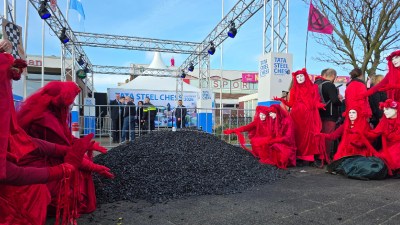Helping themselves
A self-help programme in Bihar has empowered women in some of the states poorest villages
Bara village,Gaya. Its 10.30 a.m. and Bimla Devi and some 40 other women have converged outside the dilapidated village temple for official work. Bimla is the head of Baras Gulab Self-Help Group SHG,while the others are its treasurers,secretaries,volunteers and members. After cooking for the family and finishing other household chores,these women are here for the SHGs weekly meeting.
Till three years ago,we didnt even know each others names. We just knew each other as so-and-sos bahu, says Bimla. Now,we all know all our didilog by their names. They say they owe this camaraderie to Jeevikas bhaiyalog.
Jeevika is the state governments livelihood project that was implemented in 55 blocks across nine districts in Bihar in October 2007. The project,whose main aim is poverty alleviation,now covers almost seven lakh households where women are involved in livelihood activities such as incense-stick making,farming,carpet making and administrative work with the SHG.
The major chunk of the financial aid for the Rs 306 crore project came from the World Bank while the rest is from the states coffers. A mid-term review by the World Bank last year bracketed the programme as successful. Enthused by Jeevikas success,the Union Rural Development Ministry is modelling its National Rural Livelihoods Mission NRLM programme for the state on Jeevika and will rename it Ajeevika.
Bara was among the first villages where Jeevika was launched and the programme has effected subtle changes in the lives of its women: most of them can now sign their names,they earn,they save,they send their children to school,they go to the dispensary for treatment and are aware of the perils of early marriages.
Kamal Kishore,District Project Manager Gaya at Bihar Rural Livelihoods Project,the organisation that is implementing the project,says they deliberately chose women for the mission. It is proven that if you assist women in terms of income generation,the benefit goes to the entire family,but if you assist men,the additional income is frittered away, he says.
Kanti Devi is vice-president of the Gulab SHG and takes care of the social action committee for their group. My job is to ensure all didis send their children to schools. I also go to the school to check if the teachers are regular and monitor the mid-day meal, she says. Besides,she intervenes if there are domestic or social disputes among the SHG members.
Though most of these women are illiterate,they now understand functional words such as action,clean,committee and meeting. Some of them also enrolled at the budhiya school as they call the adult school in the village. Jeevika bhaiyalog ke kaaran hamari nazar khul gayi Our horizons have broadened because of the Jeevika staff, says Kanti Devi.
About 10 km away,Barma village has got its first school,a balwadi run by the SHG. There are about 40 children between three and six who attend the school. Our children are keen to go to school after the weekend,not only because they want to learn,but also because they get a hearty meal after two days.
In neighbouring Jhikatia,a group of women is busy rolling incense sticks. Noor Jehan Khatoon,who has been making incense sticks for many years now,says,Earlier,when we did it by ourselves and sold it in the local market,we would earn Rs 4 a kg. But after the SHG was formed three years ago,the incense sticks are sold in the name of groups rather than individuals. We now earn Rs 16-20 a kg.
The women say their husbands were initially reluctant to let them join the SHGs. My husband wouldnt let me interact with Jeevika bhaiyalog. Even after I joined the SHG,he would get me to do something just as I would be stepping out for a meeting. But now,with the money coming in,he asks me once in a while,What happened to your meeting this week?
The villages where Jeevika is being run are the poorest of the poorno toilets,no electricity and poor access to health and education. But the programme has helped villagers value the importance of being self-reliant. They now have bank accounts mostly in the name of SHGs but some have personal accounts too and take small loans.
Since most of these women are illiterate,they have book-keepers and bank mitras relationship managers to help them out. Sharika Devi,who works as bank mitra for 50 SHGs and is posted at Madhya Bihar Gramin Bank MBGB,Cherki branch,says,Ive been working for them for two years. Rather than dealing with men,they find it easier to walk up to us. I help them with all the documentation and paper work and get Rs 2,250 a month.
S D Singh,manager at the MBGB branch where Sharika Devi works,says. These bank mitras are a great help in handling SHG accounts. Also,the repayment rate of these women is 95 per cent,which is way above the repayment rate of any other government scheme or even corporate loans.
- 01
- 02
- 03
- 04
- 05































